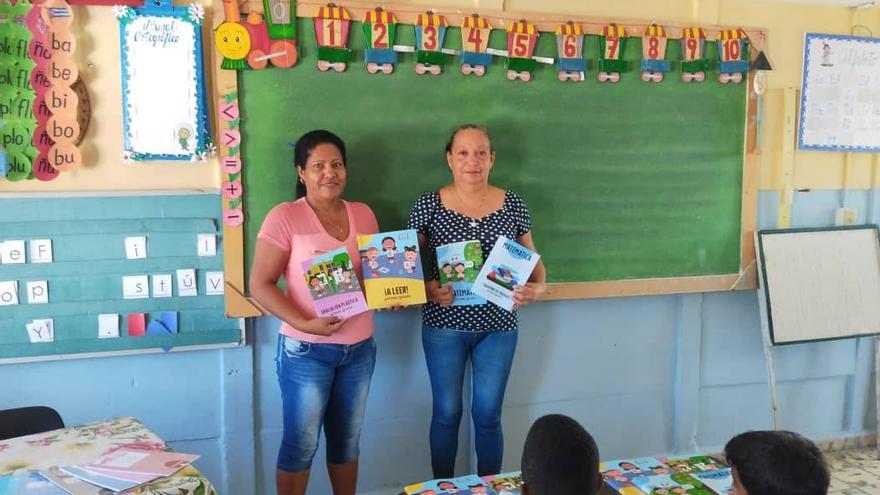
![]() 14ymedio, Havana, December 7, 2023 — The so-called Third Improvement – an attempt to update the Cuban educational system and its institutions – did not reach the classrooms of Matanzas and Camagüey until this December, when the school year was about to finish its first semester. The new textbooks, which have been delivered to very few groups of students, come with suggestions of caution because they are more “sensitive” than the old ones.
14ymedio, Havana, December 7, 2023 — The so-called Third Improvement – an attempt to update the Cuban educational system and its institutions – did not reach the classrooms of Matanzas and Camagüey until this December, when the school year was about to finish its first semester. The new textbooks, which have been delivered to very few groups of students, come with suggestions of caution because they are more “sensitive” than the old ones.
An article published this Wednesday in the official newspaper Girón gave an account of the partial update of the “material base of study” and obliquely mentioned its deficiencies. At the moment, only the first and fourth grades of primary school, the seventh of middle school and the tenth of high school have received the books. The first grades of Technical Teaching and Pedagogy also obtained new books.
The municipality of Nuevitas in Camagüey is in a similar situation, where only the first and fourth grade students received the new materials this Monday. As for the seventh and tenth, the books are expected to be distributed shortly. For the rest of the grades, which will not receive the school supplies this year, there is still no clarity on the delivery date.
The Third Improvement, which was to provide a “more comprehensive and multifaceted approach” to education on the Island, has been news since at least 2017. However, it has not been until now, six years later, that the education system has begun the first reforms, requiring much patience.
The poor quality of the books – celebrated by the authorities and the official press – has been criticized by several local officials
The poor quality of the books – celebrated by the authorities and the official press – has been criticized by several local officials of the Ministry of Education. According to the provincial newspaper, Yainet Trejo, deputy director general of the sector in Matanzas, the material with which the books are made is less resistant to wear, and each volume has a greater number of pages than previous editions, which causes the binding to break more easily.
As they are the first of the new batch to arrive in the classrooms, the materials will also be monitored with zeal. “Among the measures adopted for their conservation is foliating (assigning them a number in the warehouse) to ensure control, and the books can be covered, but without spiral loop binding or gluing the pages,” Trejo explained.
At the beginning of September, several parents of students told this newspaper that the books would be ready in the first weeks of the course. The teachers told them that the students would temporarily concentrate on reviewing the contents of the previous year.
The late delivery of the texts, however, was not accompanied by an explanation from the Ministry of Education about what content was taught in the classes in the absence of the updated material or how the course will be consistent after a sudden change in the subjects that, according to the authorities, now favor “teaching content, the participation of families in helping with the exercises and the treatment of current topics.”
Days before the beginning of this school period, the disastrous conditions with which the Island intended to start the school year were already news. The delay in the production of uniforms, the delivery of fewer school supplies – erasers, pencils, notebooks – than in previous years and the inability of many parents to buy backpacks or get snacks for their children due to the high prices kept families in suspense.
The chronic shortage of teachers is perhaps the most pressing problem in Cuban classrooms. However, turning a deaf ear to its own crisis, the Island continues to sign education agreements around the world. With a track record in countries such as Angola and Honduras, this week the regime closed an agreement with Colombia to provide assistance in this field.
The memorandum, which had been negotiated in June, will be the starting point of the joint program Education in the First Place, and a Cuban delegation is expected to assist Colombia in the curriculum design, pedagogical follow-up and the “human rights approach in public education,” among other aspects.
The program signed by Havana and Bogotá will be in force until December 2024. The authorities did not clarify at any time whether, as was done with Honduras last January, the Island will send the “education professionals” who are so scarce in its own classrooms.
Translated by Regina Anavy
____________
COLLABORATE WITH OUR WORK: The 14ymedio team is committed to practicing serious journalism that reflects Cuba’s reality in all its depth. Thank you for joining us on this long journey. We invite you to continue supporting us by becoming a member of 14ymedio now. Together we can continue transforming journalism in Cuba.
